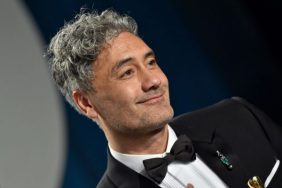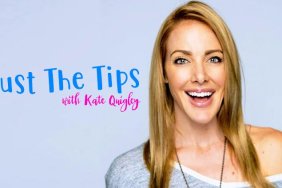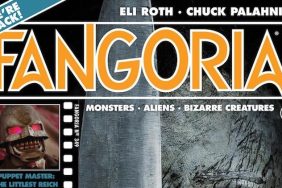Kate Beckinsale has had – and she admits as much – a schizophrenic career. She is just as well-known for playing in classical Shakespearean dramas and moody independent dramas as she is for kicking ass in catsuits in films like Underworld and Van Helsing. Her latest film, Love & Friendship, currently in theaters, is her second collaboration with director Whit Stillman, and certainly not her first brush up against the works of Jane Austen.
Beckinsale, fragrant and open, sat down with Crave to talk about how Lady Susan, her Love & Friendship character, is perhaps a deeply feminist figure, despite her borderline despicable behavior. She was also open about the oddness of her career, and was eager to talk about the most exhilarating moments she’s had as a performer. She also reveals what song she can sing, word-for-word, at karaoke.

Roadside Attractions
Also: Sundance 2016 Review | ‘Love & Friendship’ and the Wit of Whit
Crave: This is your second time working with Whit Stillman. How would you characterize him as a director?
Kate Beckinsale: He is unlike anybody else. What’s so wonderful about him is he’s so intellectually gifted. And so elegant. And so aware of the nuance of what’s funny and what’s witty. And he’s just the most interesting creature. He writes brilliantly. There’s no one like him. He’s got a real sense of what’s offbeat, of what’s broad. He’s such an expert, and he’s such a great for for Jane Austen, I think, in terms of social observation. He’s so precise in what he’s doing, and the characters he’s portraying. I feel lucky to have worked with him once, let alone twice. Big fan.
This perhaps the first Jane Austen adaptation I’ve seen that seems focused on her comedic strengths. I’ve seen a lot of Austen adaptations, and most filmmakers tend to focus on the romance…
I think the thing about Jane Austen is, again, her wit is so dry. Her characters are often so funny and so particular. And I do think this is a different type of Jane Austen. It’s unusual to be sitting in a movie theater belly-laughing at a Jane Austen movie. But it’s very much like that in the novella. It’s a very envelope-pushing, with a much more extreme character at the center of it, than I think we’re used to. And 80 to 90 percent of what comes out of my mouth in the movie is straight Jane Austen. So the novella is very much this tone.
And I love the fact that it’s surprising. Like you said, a lot of people have seen a lot of Jane Austen, but this does seem like a very different sort of a vibe. And yet, [Lady Susan] is alone. I think what we’re used to is a little bit more restrained maybe. And this is a bit more unchanneled.
I suppose that change in tone is safe when dealing with a less familiar Austen work. Indeed, wasn’t this work incomplete?
She wrote it when I think she was 20 years old, and didn’t publish it. And I think it wasn’t until many, many years later after she had died that her nephew decided to publish it under a title he had made up, which was Lady Susan. So this is something, I suppose, that would fall under juvenilia for her. And it feels like, as the cast, the privilege of playing Jane Austen on the big screen for the first time in 2016 is pretty massive, actually.

Roadside Attractions
Also: Whit Stillman Talks Jane Austen, Love and Friendship (Interview)
What’s your relationship with Jane Austen? I suppose everyone’s a fan on some level.
Right. I was in school in England, and when I was 17, you would specialize in one of three subjects: Russian, French, or German. My education in terms of English literature stopped then, and I was anointed with Brecht and Moliere and Ostrovsky and all that. I’ve got a fairly rudimentary English private school relationship with Jane Austen. There are Jane Austens I’ve read for pleasure, but it wasn’t very nice to study her at university or anything like that.
I really fell in love with her playing Emma. Obviously I fell in love with Emma, but also started reading her other stuff. But I loved that character so much. I loved that Jane Austen referred to her as being an incredibly unlikable character. Which I don’t agree with, but I liked that she wrote such a complete character. She’s flawed and you still love her. Lady Susan is very similar in that respect. She’s much more flawed than Emma, but I think she’s one of those people you like despite yourself.
Is that a struggle, or do you welcome to challenge to play a compelling but unlikable character?
I’ve always been drawn to those. As an actor, it’s very invigorating. I don’t think I’m particularly interested in thinking that actors have to be likable. I think that can get in the way of a character. I think the fact that Lady Susan is so unapologetic in terms of herself. She’s not insecure. She’s very fascinating due to those things, and that’s why people like her. But there was never a moment of me asking myself how I can make the character likable.
The only thing being, in the novella, Lady Susan is always referred to as being charming and very smart and cultured and rather modest. So she’s not coming off as a dolt. She does have a great deal of success, socially, because she is likable. But there’s quite a lot going on that’s suspect [laughs].
I saw a lot of parallels between her and your character from Last Days of Disco, actually.
I actually think that Charlotte in Last Days of Disco was a far more unpleasant person than Lady Susan. I think that what mitigates Lady Susan is that she’s very much a product of the period of time when women were so constrained. In terms of education, in terms of your freedom to an education, to a career, to finances, to a free sexual life. These were all things that were absolutely off the table. And I think that what mitigates Lady Susan is she sees those things as her right. Women ended up fighting for a lot of those things. So she was pioneering within that time period as someone who absolutely sees those things as within her right. And it’s just a matter of the different ministrations in order to get them might not necessarily meet everyone’s approval, but, at base, I can completely approve of. Whereas Charlotte in Last Days of Disco is just kind of got a mean streak [laughs].

Universal Pictures
Looking back over your whole career, you seem to have two modes of operation. On the one had, you work with Whit Stillman and other notable directors making intimate character pieces. On the other, you’re making Van Helsing…
I think the thing is, it’s in terms of telling a story, in terms of movies, I’m not really a snob. I think there’s room of all kinds of movies, and really you’re getting different things out of going to see a popcorn action movie than you are as when you see a Tolstoy adaptation. I think it would be a pity if there were only one thing in the world. I think people are in the mood for different things. I think when I started acting my big concern was… I didn’t want to be confined to doing just one kind of thing.
I view my career as an apprenticeship, and as much as possible, one should go to their job a bit off their game, and frightened that you’re not going to be able to pull it off. Because I think that’s how you grow as an actor. And you can grow as an actor in an action movie. It’s all about pushing your comfort zone a bit. In terms of your ability and inhibition and what you’re learning. In terms of who, as an actor, has it at their disposal. There is absolutely room for doing something that may seem a little more broad to other people.
But to me, how I started and what I studied and how I went to school and all that, Jane Austen and Chekhov/Shakespeare is much more in my wheelhouse and comfort zone; it’s what I’m comfortable doing. But that doesn’t necessarily mean that that’s all I should be doing. I feel like I’ve grown a lot as an actor by doing things that have made me feel like “Oh my God, I’m not sure if I’m going to be able to do this.” And some of that has involved jumping off buildings. But it all goes into this sort of mix of those long perspectives in terms of growing as an actor.
I have to bring up some of my favorite performances of yours. I love Cold Comfort Farm…
Oh, thank you. Me too. Apparently, so did Whit. That’s how come I ended up being given Last Days of Disco, was off that movie. So you and Whit Stillman have a lot in common. [Laughs.]
We also have the same name.
Yes!

Roadside Attractions
Looking at Flora Post, and some of the other greats along the way, it’s starting to look like Lady Susan is your best role. They all seem to be influencing one another.
Thank you very much. It’s a wonderful role, and I feel incredibly lucky to have it. I suppose she’s a kind of vehement, strong, unapologetic female. And I’ve been lucky enough to have a few of those in various permutations over the years. But yeah, she might be the funnest one yet.
You didn’t have any scenes together in this film, but you’ve worked together before. Did you have a good reunion with Stephen Fry?
I didn’t get to have one! That was my one day off in the movie. I was, um… in flagrante during those scenes. Off-screen in flagrante with my lover. That was the day I ended up going home and visiting my honey. Which was a shame, because, yes, he was in Cold Comfort Farm, so it was a reunion on several levels. But they only had him for one day, and apparently it was Friday the 13thWe’, and they called it Stephen Fryday. So they had to bend over backwards to get everything with him in that one day. And that was the day I wasn’t there. So, yeah. Missed that.
Another one of my favorites of yours – and it was one of the best films of its year – was Snow Angels.
Oh thanks! Me too! I love that movie! So you’re one of the five people who saw it!
It just rips your heart out, that movie.
It was such an amazing experience, that movie. It was such a wonderful acting experience. I love Sam Rockwell. I’ve worked with him a couple of times now… That was some really wonderful, dangerous sorts of acting. It was so exhilarating. It’s kind of like finding your suddenly dancing on a level that you didn’t imagine. You live for those moments as an actor. There were some moments when Sam and I in that movie… you know [director] David Gordon Green is one of those directors very much has a respect for things unfolding in the moment, but can surprise you, and allows you that level of freedom.
So Sam and I would, you know, retreat to our corners like fighters, and there was really a kind of electrical feeling in that room when we were doing some of the really intense scenes where, well, we just didn’t know what was going to happen. It was quite terrifying, but exhilarating at the same time. Are we actually going to for-real kill each other? What’s actually going to happen. You do live for those moments as an actor, because it’s absolutely thrilling and intoxicating. And they don’t come around every single day. It’s sort of a combination of different things that make it magical in a certain way. And I really remember that really well from that movie. And it is exhausting and emotional, but when it’s working like that, it’s so energizing as well. You sort of crave it. You want to do it again. It’s like childbirth.
So after Love & Friendship, are you going to take a break from the classics again?
Not at all! I have never meant to go away from it. One is also not necessarily in charge of every project that is being made already. You have even a shot at doing it. I would have been perfectly happy doing Shakespeare and Jane Austen the whole time, it’s just that people were rather more keen on handing me a machine gun. I’ve probably not really planned my career. I’ve just allowed it to unfold. And, as such, it may feel a bit weird and schizophrenic in the long term. But I’m a bit amused by the permutations that it’s taken, and I’m interested to see where it’s carrying me next.
What was the first record you bought with your own money?
Oh my goodness. It was… I have feeling it was a single. It was Wham! rapping, and I think it was called “Wham Rap!” I think in brackets it was “(Young Guns)” or something like that. [Ed. It was actually “(Enjoy What You Do?)”]. That’s quite an embarrassing one, isn’t it? I could do it karaoke, word-for-word, no problem. ’82 and ’83 was a pretty great years for music, I think.
Top Image: Roadside Attractions
Witney Seibold is a contributor to the CraveOnline Film Channel, and the co-host of The B-Movies Podcast and Canceled Too Soon. He also contributes to Legion of Leia and to Blumhouse. You can follow him on “The Twitter” at @WitneySeibold, where he is slowly losing his mind.









